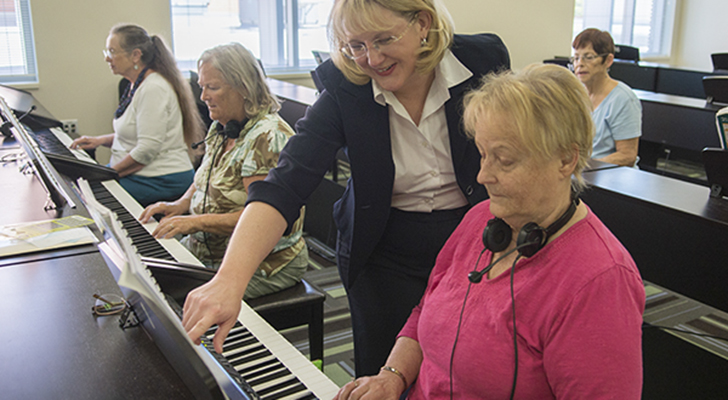
USF research on the cognitive benefits of musical training will be presented at Harvard Medical School at the Neurosciences and Music-VI Conference.
Jennifer Bugos, PhD, assistant professor of music education in the USF College of the Arts, was invited to present her work at the international conference, along with several USF students taking part in her interdisciplinary studies.
“It is an honor to have been invited to participate in such a prestigious conference that features presentations by leading researchers from all over the world. Results from our studies show that music has powerful effects for children, seniors and clinical populations such as those with Parkinson’s disease,” Dr. Bugos said.
“We look forward to representing USF on the international stage and at the leading edge of research that has the potential to provide information on how musical training engages the mind and prepares the mind for learning across the lifespan.”
Dr. Bugos will lead a session titled “Group Piano Training on Executive Functions and Psychosocial Outcomes in Older Adults.”
The presentation will give her an opportunity to spotlight findings from research that spans more than a decade and was inspired by her own family’s experiences.
While studying for her doctorate, Dr. Bugos was a caregiver for her grandmother, who had been in a vegetative state for 15 years, and her grandfather, who suffered from dementia.
“I would play the piano for them, playing songs I knew were familiar to them, like ‘Battle Hymn of the Republic,’ ” Dr. Bugos said. “I noticed that my grandmother would move her big toe to the beat — which meant she could remember the song. My grandfather would sing all of the words to this song but at the time, demonstrated impaired language skills. I wondered if playing music, because it integrates cognitive and motor processes, might be able to help prevent someone from getting that far into the disease. That’s what sparked my research into the power of piano training in healthy aging.”
Since her grandmother’s tapping toe piqued her curiosity, Dr. Bugos has authored numerous studies examining the potential benefits of musical training for older adults. Among her findings:
- “Individualized Piano Instruction Enhances Executive Functioning and Working Memory in Older Adults,” published in Aging & Mental Health in 2007, found that individual piano instruction positively affected attention and concentration, which benefitted overall working memory, in study participants aged 60-85.
- With “The Benefits of Music Instruction on Processing Speed, Verbal Fluency, and Cognitive Control in Aging,” published in Music Education and Research International in 2010, Dr. Bugos found that seniors who participated in group music activities — either music appreciation classes or piano lessons— both experienced gains in processing speed, verbal fluency and cognitive control.
- “Intense Piano Training on Self-Efficacy and Physiological Stress in Aging,” published in Psychology of Music in 2015, found that a short-term music-training program challenged senior citizens without causing them stress. Such programs may be effective in hooking older adults on piano, increasing the likelihood that they continue with the instrument and experience the cognitive benefits of long-term music training.
Dr. Bugos has received grants from the Retirement Research Foundation, McKnight Brain Research Foundation, GRAMMY Foundation, National Endowment for the Arts, the USF School of Music and College of The Arts to fund her research.
She’s also garnered international attention.
Within the past year, both the Washington Post and National Geographic have featured her work.
“Musical training seems to have a beneficial impact at whatever age you start. It contains all the components of a cognitive training program that sometimes are overlooked, and just as we work out our bodies, we should work out our minds,” Bugos told National Geographic in February.
Most recently, Dr. Bugos has focused her research on the opposite end of the age spectrum, exploring the effects of musical training on the cognitive development of preschoolers, finding that children who participated in a music program made greater progress in inhibition, or the ability to correct mistakes, than kids who participated in a LEGO-based program. Results were published in Psychology of Music earlier this year.
Dr. Bugos is continuing her research with both age groups. Each week, groups of senior citizens and preschoolers take part in her studies at the Music Building on the Tampa campus.
She’s also expanded her inquiries to look at the effects of musical instruction on middle-aged individuals and those diagnosed with Parkinson’s disease. Dr. Bugos and the students assisting in the Parkinson’s research are hoping piano lessons will lead to improvements in the patients’ physical dexterity, cognitive abilities, and feelings of connection as they develop friendships with other study participants.
Dr. Bugos has partnered with Darlene DeMarie, PhD, associate professor in the College of Education, Jerri Edwards, PhD, associate professor in the School of Aging Studies, and Teresa Lesiuk, PhD, associate professor of music therapy at the University of Miami, in her research.
At the Neurosciences and Music-VI, USF undergraduate students Patricia Rodriguez and Shafa Nathani, both cell and molecular biology majors, will present a poster describing preliminary data from the Parkinson’s study as well as the screening process involved.
Natalie Molina, also a cell and molecular biology major, and Music Education doctoral student Morgan Burburan will present preliminary data from Dr. Bugos’ study on preschool children’s emotional responses to singing.
Music Education doctoral student Patrick Cooper will also attend the conference to present data on the effects of mallet training on self-efficacy and processing speed in older adults.
Now in its sixth year, the Neurosciences and Music convenes neuroscientists, psychologists, clinicians, therapists, educators, musicians, musicologists and students from all over the world. In addition to the University of South Florida, speakers at the event represent institutions such as the University of Zurich, Michigan State University, The Ohio State University, Stanford University and the University of Oxford.
Story by Rachel Pleasant, University Communications & Marketing, Photo by Freddie Coleman, USF Health Communications